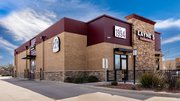News
Court allows foodborne illness coverage in Taco Bell franchisee suit
June 18, 2009
NEW BRUNSWICK, N.J. — The Superior Court of New Jersey has ruled in favor Taco Bell franchisees who had filed suit when their foodborne illness coverage was denied after a 2006 outbreak of E.coli at a number of Northeast restaurants.
The decision referred to an E.coli outbreak at Taco Bells in New York, New Jersey, Pennsylvania and Delaware allegedly traced to lettuce delivered to them. Approximately 70 Taco Bell franchisees controlling more than 1,300 Taco Bell stores filed suit against underwriters of the insurance company Lloyds of London when coverage was denied due to an obscure provision in the policy.
The Taco Bell franchisees had originally purchased Food Borne Illness (FBI) insurance from the Lloyds Market in 1999-2002. When that coverage was discontinued, the franchisees instead bought Trade Name Restoration, Loss of Business Income and Incident Response Insurance for Food Borne Illness (TNR) policies.
Unbeknownst to the franchisees, however, the new policies contained an "aggregate supplier incident sublimit," not present in the previous FBI polices, indicating a dollar amount of $0. When the franchisees suffered lost income stemming from the 2006 so-called "Taco Bell Outbreak" of E.coli, Lloyds asserted that the $0 sublimit precludes insurance on account of any alleged involvement of a "supplier" and refused to cover the losses.
The court's ruling
Invoking the policyholders' reasonable expectations and noting that "any exclusion must be clear," Hon. Judge Phillip Lewis Paley, JSC, found that an "aggregate supplier incident sublimit" cannot be used as a stealth exclusion to deny coverage for business income losses stemming from food contamination that was allegedly caused by lettuce that went into some Taco Bell menu items.
The court noted that the marketing for TNR insurance stated that "even the best restaurants can suddenly be trapped in an infectious health situation...due to a food borne illness or supplier mistake that ends up totally out of control."
Noting the plaintiffs' contention that "no one explained that that sublimit would exclude coverage previously provided under FBI insurance," the court asserted the sublimit does not exclude coverage for the outbreak.
The decision also emphasized the apparent continuity between the FBI and TNR coverage that the franchisees purchased from Lloyd's: "TNR insurance may differ from FBI insurance, but there is no evidence that the franchisees were told that earlier coverage was being reduced.... Plaintiffs reasonably believed that the policy was tantamount to a 'renewal' of those issued earlier which would mirror...the terms of the coverage...afforded in the past."
The court further found that the language describing the sublimit did not on its face apply to the particular occurrence, as the sublimit paragraph was rife with undefined terms, including "supplier," "supplier incident," "emanating from," "operations," "a product supplier of the insured" or "sublimit."
The court's opinion accordingly rejects several of the insurance company's interpretations of policy language, including their argument that the lettuce was a "product," to which the sublimit would apply, as opposed to "an 'ingredient,' something used to produce or prepare 'the insured's products.'"
William G. Passannante, lead counsel for the Taco Bell franchisees, said, "Restaurant owners buy TNR insurance expressly for protection against losses stemming from allegations of food contamination. Attempting after the fact to impose a sublimit of $0 on a type of occurrence not expressly excluded is nonsensical.
"The court upheld the crucial insurance principles that (1) exclusionary language in insurance policies must be clear; (2) ambiguous language in insurance policies is interpreted reasonably in favor of the policyholder; and (3) reductions in insurance coverage should be made clear to the policyholder. Reaffirming these rules helps solidify the value of insurance policies already paid for by policyholders with hard-earned dollars."
The Taco Bell franchisees were represented by Passannante, Esq. of Anderson Kill & Olick P.C., and Steven J. Pudell, Esq. of Anderson Kill's Newark, N.J., office.
Congressional steps toward food safety policy
The U.S. Congress Energy and Commerce Committee has unanimously approved a comprehensive bipartisan bill that, if approved by the full House and Senate, is aimed at improving food safety
The bill specifically directs the U.S. Food and Drug Administration to take steps to prevent foodborne illness and assigns resources to begin the job. The bill would make food safety a primary focus of the FDA.









